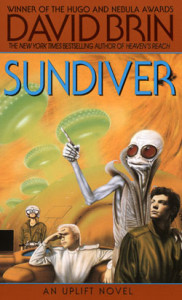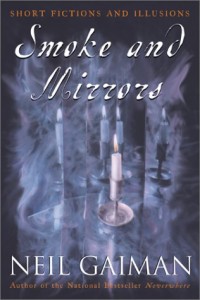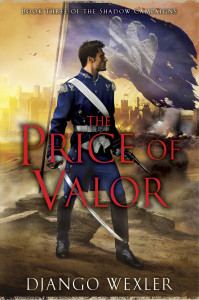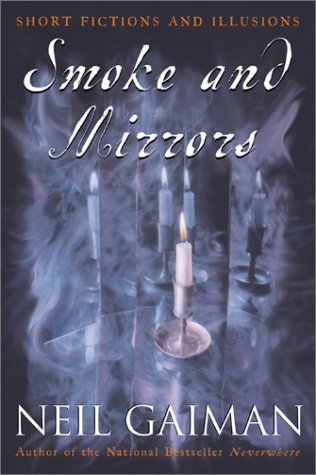For this week’s Flashback Friday post, I’m happy to have fantasy author, Django Wexler, here for a guest post on how Isaac Asmiov, David Brin, and Neil Gaiman influenced him as a writer.
I started reading in the pre-Potter world, before J.K. Rowling‘s juggernaut convinced the publishing industry that kid’s books could be deep and fun at the same time and created modern YA. I like to joke that all I had growing up were Goosebumps and Newbery Award-winning books about dead dogs. While it’s not quite true, pickings were certainly slim for good (read: science fiction and fantasy) stuff in the children’s section. I read Lloyd Alexander‘s Chronicles of Prydain and Tamora Pierce‘s Song of the Lioness Quartet, but when I went looking for more, I had to wander over into the adult section.
Fortunately, my first job was working as a page at the Dobbs Ferry Public Library, which had an extensive, if slightly eclectic, science fiction and fantasy section. With nobody to supervise me, I read the whole thing. (Almost; I drew the line at L. Ron Hubbard, even then.) It was a strange introduction to the genre, because some brilliant stuff and well-known classics were mixed in with donated garage-sale books I’ve never seen mentioned before or since. But I read Dune, Stranger in a Strange Land and Rendezvous With Rama, along with way too many Dragonlance and Xanth books.
At the time, I leaned more in the direction of science fiction than fantasy, and my parents eventually got me a membership in the Science Fiction Book Club. Back then they did a lot of cheap omnibus editions and collections, which was perfect for me, and I still have quite a few of them in my library. This was how I was introduced to science fiction short stories, which probably more than anything else, even more than some of my most beloved novels, got me started on the path to being a writer.
 Among the short story authors, a few stand out in my memory. The first is Isaac Asmiov, whose complete story collection I still own (apart from the one story my dog ate). I think it’s hard for readers today to really appreciate Asimov, for two reasons. First, like Tolkien and other classics, the ideas he introduced are now overused to the point of cliché. Second, the market has moved away from short fiction in favor of novels, and while Asimov is famous for Foundation, in my opinion his long form work was never his best. It always felt dry and over-serious to me, while his short stories sparkled with charm, wit, and clever wordplay. He would write a whole story to get to a particularly groan-worthy pun, or a very specific insight into technology, or to illustrate a clever idea or bit of character interaction. He was a master of this small canvas, and the didactic style that can bore at novel length feels fast and light in a short, with big ideas squeezed into tiny spaces.
Among the short story authors, a few stand out in my memory. The first is Isaac Asmiov, whose complete story collection I still own (apart from the one story my dog ate). I think it’s hard for readers today to really appreciate Asimov, for two reasons. First, like Tolkien and other classics, the ideas he introduced are now overused to the point of cliché. Second, the market has moved away from short fiction in favor of novels, and while Asimov is famous for Foundation, in my opinion his long form work was never his best. It always felt dry and over-serious to me, while his short stories sparkled with charm, wit, and clever wordplay. He would write a whole story to get to a particularly groan-worthy pun, or a very specific insight into technology, or to illustrate a clever idea or bit of character interaction. He was a master of this small canvas, and the didactic style that can bore at novel length feels fast and light in a short, with big ideas squeezed into tiny spaces.
 David Brin, unlike Asimov, did really good work at all lengths. His short work is very different from Asimov’s: looser, weirder, less tied to physical concepts and more interested in mythology and philosophy. He shares the ability to pack a huge amount of metaphysical stuff into a small word-count, leaving you with stories that expand in your mind to fill it to the edges. Several of his slightly longer pieces, like Thor Meets Captain America, The Loom of Thessaly, and The River of Time (all in the collection of the same name, incidentally) are some of my favorite bits of short fiction. In each, he takes a concept — not a hard-SF concept, either — and explores implications in a fascinating way.
David Brin, unlike Asimov, did really good work at all lengths. His short work is very different from Asimov’s: looser, weirder, less tied to physical concepts and more interested in mythology and philosophy. He shares the ability to pack a huge amount of metaphysical stuff into a small word-count, leaving you with stories that expand in your mind to fill it to the edges. Several of his slightly longer pieces, like Thor Meets Captain America, The Loom of Thessaly, and The River of Time (all in the collection of the same name, incidentally) are some of my favorite bits of short fiction. In each, he takes a concept — not a hard-SF concept, either — and explores implications in a fascinating way.
Brin’s novels were also huge for me. The Earthclan books — Sundiver, Startide Rising, and The Uplift War — were probably the first real “space opera” I’d seen, and I read through them over and over. His near-future thriller Earth was a particularly interesting case: published in 1990 and describing the world of 2040, it shaped my view of what the future was going to look like, and watching it come true (or not) has been fascinating.
 Third, and last chronologically for me, there’s Neil Gaiman. These days, I’ve read everything he’s written, and his books are legendary, but as a teenager it was his collections of short stories that captivated me. Smoke and Mirrors, in particular, is astonishing. Like the other two authors I’d mentioned, Gaiman’s stories often rely on a single idea or conceit, but he goes to far stranger places, and often leaves you feeling chilled. Chivalry, The Price, Murder Mysteries, and Snow, Glass, Apples from that collection are all awe-inspiring, and the 100-word story Nicholas was… may be the perfect piece of ultra-short fiction.
Third, and last chronologically for me, there’s Neil Gaiman. These days, I’ve read everything he’s written, and his books are legendary, but as a teenager it was his collections of short stories that captivated me. Smoke and Mirrors, in particular, is astonishing. Like the other two authors I’d mentioned, Gaiman’s stories often rely on a single idea or conceit, but he goes to far stranger places, and often leaves you feeling chilled. Chivalry, The Price, Murder Mysteries, and Snow, Glass, Apples from that collection are all awe-inspiring, and the 100-word story Nicholas was… may be the perfect piece of ultra-short fiction.
The odd thing is, I never ended up going down the short-fiction road myself to any great extent. I tried — early in my writing career, I wrote stories slathered in Gaiman-isms or with Brin-style ideas — but as I went along, I got hooked on the deep character and worldbuilding of novels, especially giant fantasy series. But it was those short story collections from the SFBC, with their cardboard covers apparently irresistible to dogs, that got me to sit down at the keyboard in the first place, maybe because the idea of writing a short seemed a little more achievable.
Django Wexler’s latest work is The Forbidden Library, a young adult fantasy about a book that is more than it seems. The Price of Valor, book 3 in his epic fantasy series, The Shadow Campaigns, comes out in July of 2015.
 In the wake of the King’s death, war has come to Vordan.
In the wake of the King’s death, war has come to Vordan.
The Deputies-General has precarious control of the city, but it is led by a zealot who sees traitors in every shadow. Executions have become a grim public spectacle. The new queen, Raesinia Orboan, finds herself nearly powerless as the government tightens its grip and assassins threaten her life. But she did not help free the country from one sort of tyranny to see it fall into another. Placing her trust with the steadfast soldier Marcus D’Ivoire, she sets out to turn the tide of history.
As the hidden hand of the Sworn Church brings all the powers of the continent to war against Vordan, the enigmatic and brilliant general Janus bet Vhalnich offers a path to victory. Winter Ihernglass, newly promoted to command a regiment, has reunited with her lover and her friends, only to face the prospect of leading them into bloody battle.
And the enemy is not just armed with muskets and cannon. Dark priests of an ancient order, wielding forbidden magic, have infiltrated Vordan to stop Janus by whatever means necessary…
Click here to read other Flashback Friday posts by other authors including Jean Walker, GG Silverman, and more.


